Jewish heritage centre plan for Norwich as it reflects on its past
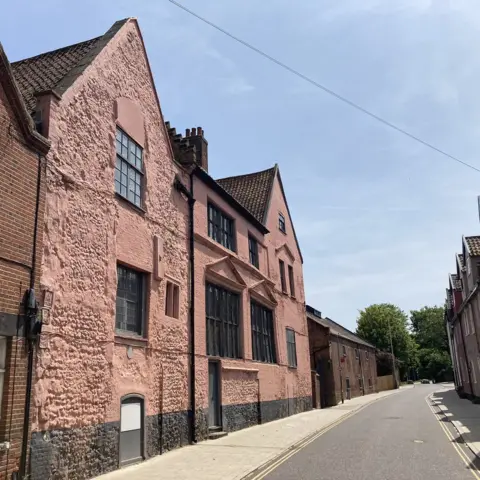 Matt Precey/BBC
Matt Precey/BBCPlans are being drawn up to create a centre for Jewish heritage in Norwich.
The city's "foundational" role in the rise of antisemitism centuries ago made it the right location, said organisers.
It comes after the lord mayor apologised for the so-called Blood Libel, which originated in the city, and a massacre in 1190.
Dr Oren Margolis, from the University of East Anglia (UEA), said the centre would reflect Norwich's historic importance to the faith.
The expert, who heads the UEA's Committee for Jewish Heritage and Culture, said fundraising for the centre was under way.
The plan looks to locate the centre at the site of Jurnet's House, described as the oldest known Jewish dwelling in England.
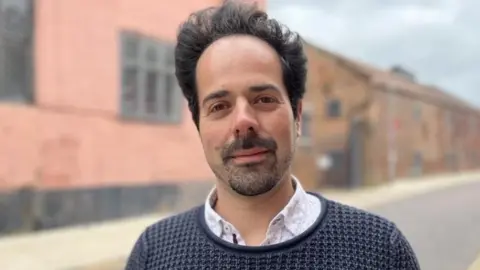 Shaun Whitmore/BBC
Shaun Whitmore/BBC"We are committed to establishing a centre for the promotion of Jewish heritage, culture and study, including research into historic and contemporary antisemitism," Dr Margolis said.
The proposed location is also the oldest dwelling in the city and was home to the prominent Jewish Jurnet family in the early thirteenth century.
The crypt is all that remains of the original Jurnet's House on King Street and the entire building closed in 2020 because of damp and mould.
'Wide-reaching importance'
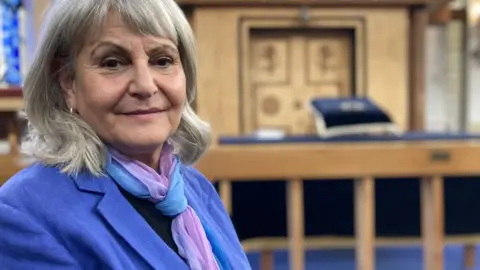 Matt Precey/BBC
Matt Precey/BBCDr Marian Prinsley, a deputy lieutenant of Norfolk and a prominent member of the local Hebrew congregation, emphasised the city's significance in history.
"The medieval Jewish history of Norwich has a wide-reaching importance well beyond Norwich. It extends to Jews in England, but also to Jews around the world," she said.
Dr Prinsley, whose synagogue has been leading the fundraising efforts, added the hope was for the UEA to also set up an academic post.
"This has been quite a lonely journey for the Norwich Jewish community because we are very much on our own," she said.
"We're a tiny community, we don't have resources. So to have the backing of the university with a view to the possibility of establishing a chair of Jewish studies is utterly brilliant."

The Blood Libel
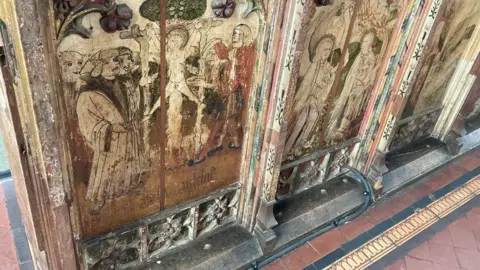
Inside Holy Trinity Church in the Norfolk town of Loddon is an antisemitic image depicting child murder.
A painting on wood, known as a rood screen, depicts the crucifixion of a 12-year-old boy called William at the hands of Jews in Norwich in 1144.
This entirely fictitious scene was created centuries after an account written by a monk called Thomas of Monmouth, who concocted the story in an effort to turn the child into a saint.
Monmouth's book is the first recorded instance of the so-called Blood Libel - the claim that Jews killed Christian children - which resurfaced across Europe in the decades and centuries that followed, often with terrible consequences.
According to Dave Rich, the author of Everyday Hate - a book that documents present day antisemitism - those ideas "embedded themselves in our consciousness".
"It repeats throughout our culture and then we see today conspiracy theories like the QAnon movement which, again, claims secret elites kidnapped children and drink their blood," he said.
"It doesn't always claim that they're Jewish, but it's clearly kind of repeating this Blood Libel idea that originated in Norwich all those years ago and using it as part of a very powerful and influential modern political idea."

The Norwich massacre
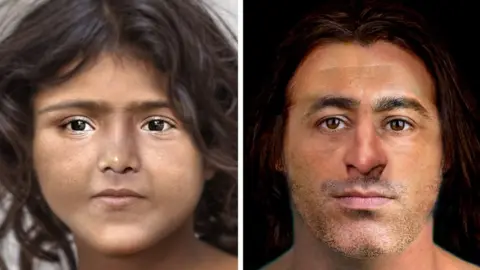 Prof Caroline Wilkinson/Facelab/Liverpool JMU
Prof Caroline Wilkinson/Facelab/Liverpool JMUIn 1190, many of Norwich's Jewish inhabitants were murdered, with the survivors taking refuge at the city's castle.
The remains of 17 people were discovered down an old well during the construction of the city's Chapelfield shopping centre at the turn of the millennium.
Last year, DNA testing established a strong genetic link to Ashkenazi Jews and dated their deaths to around the time of the massacre.
As well as the false rumours concerning William of Norwich, in the 1230s it was alleged a member of the Jewish community had abducted and circumcised a Christian boy, leading to violence and Jewish homes being burned.
England became the first country to expel its Jews in 1290 following Edward I's edict and the Norwich community was not re-established until after 1656, when Oliver Cromwell allowed them to return to Britain and practise their faith freely.
The city was also the home of Meir of Norwich - the most prominent English Jewish poet of the medieval period.

In present day, Norwich's Jewish congregations total several hundred people.
Along with other congregations around the country, the Norwich Synagogue has taken security measures in recent years, provided by the Community Security Trust.
The Home Office has helped fund this following terror attacks against Jewish targets in Europe in 2015.
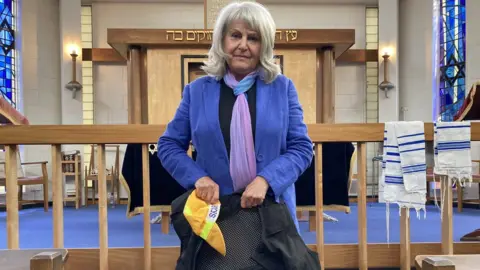 Matt Precey/BBC
Matt Precey/BBCDr Prinsley said: "We don't feel entirely safe. We feel largely safe and I personally haven't been the victim of any overt antisemitic action."
In April, the then Lord Mayor of Norwich, Dr Kevin Maguire, apologised for the city's historic treatment of its Jewish inhabitants at a meal to mark Passover, known as a Seder, at the UEA.
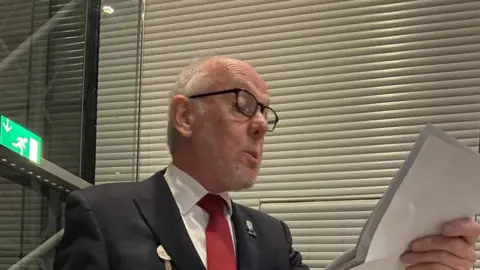 Peter Prinsley
Peter PrinsleyIn his speech, he said "the answer is to say 'no more' and to work for Norwich to be free of antisemitism - and to counter the lies told blatantly by those who would wish to foment hate".

Find BBC News: East of England on Facebook, Instagram and Twitter. If you have a story suggestion email [email protected]
